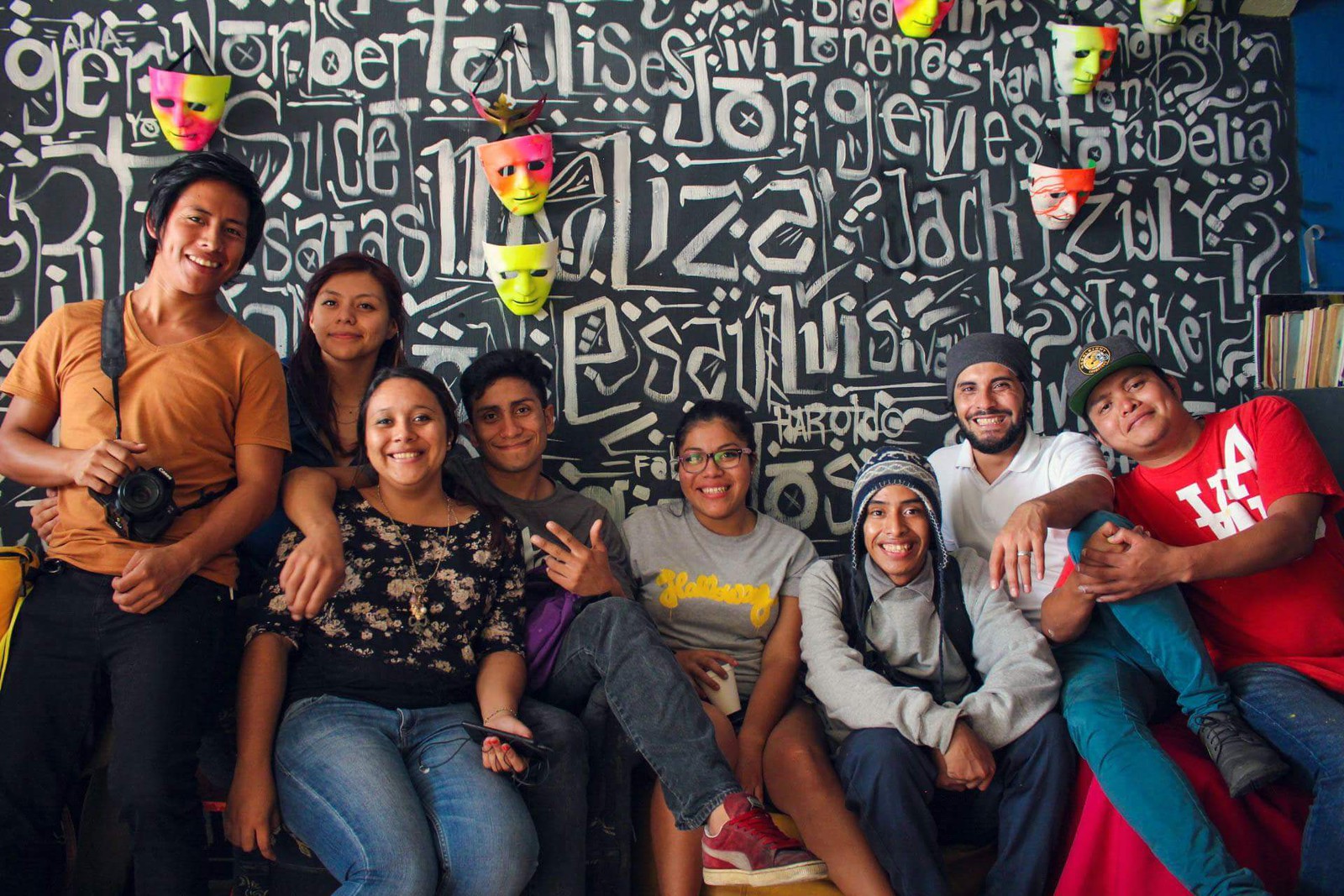
AFSC youth participants, staff, and volunteers in Guatemala during the making of the "Songs for Peace" CD. Guatemala / AFSC
Young people in Guatemala channel their creativity and commitment to peace building into a new music project.
As a program coordinator for AFSC in Guatemala, one of the most violent countries in the world, I see up close the challenges that young people face in trying to live their everyday lives—extreme poverty, discrimination, and gang violence.
Our approach to working with youth includes encouraging them to engage in both reflection that fosters a peaceful coexistence and action to develop nonviolent practices to transform daily conflicts. We work in particular with youth-led organizations, offering through them opportunities for other youth to be part of Micro-Peace Networks (MPN). As part of these MPNs, young people come together in small groups of eight to 12 youth members, exchange ideas, enhance their leadership skills, and plan and promote nonviolent community activities.
Many of the young people we work with are artists as well as activists concerned about the struggles facing their communities. That's why we developed an art-based methodology to help youth create social change through different artistic expressions to bring heightened awareness of societal, ecological, and political issues.
Earlier this year, AFSC staff brainstormed with MPN participants about a new art project to spread our message of peace, love, and justice. We considered murals, art exhibits, dance, and finally agreed that we should communicate through music.
We all know music is powerful. It’s a soundtrack for our emotions and moments in our lives. It can convey feelings for those who may not have another place to voice concerns. It can inspire us to take action. Music opens a peaceful way of resistance while shutting out the sounds of guns and bombs. Music can enlighten the world about those who suffer from violence and insecurity and can build bridges of understanding.
We decided that we would create “Songs for Peace,” a collection of three songs written, performed, and produced by youth active with AFSC.
Youth were invited to submit original songs for consideration and to take part in the production. We selected three songs written by MPN members: "Somos" (This is who we are), "No más violencia" (Stop violence), and "¡Basta ya!" (It has to stop)—a mix of alternative rock, pop, and vallenato (a kind of folk music).
The lyrics are strong; we can hear very powerful demands in verses like: "Salaries are going down and bullets are rising, war and death, we are under fire. I'm afraid to go out to the streets. Shootings and fights, things are heating up"—words that come from young people who face danger and severe stress in their communities, yet are brave and willing to defend human rights.
We can hear young women singing strongly: "No more violence, stop your indifference. Peace is not just the absence of war, I'm deciding to live and to smile, I deserve to be happy," even in a country with one of the highest rates of femicide in the world.
As people who work with youth, we see how lots of young women are lifting up their voices to fight against the country's deeply rooted patriarchal and ageist society. This CD is one example of how music serves as an educational tool to inform both listeners and participants, but also how music (and other artistic expressions) can be a therapeutic tool to treat issues affecting adults, young people, and children.

Our “Songs for Peace” CD was about putting every effort together to complete a tangible and creative mechanism for young people to build peace and to raise awareness about violence, especially against youth living in Guatemala's "hot spots" with high rates of crime. The project also brought together creative thinkers and artists committed to civic engagement and organizing a generation of activists.
We would like to thank every volunteer who helped make this wonderful piece of art, from the producer to the designers.
The great strength of art is that it is universal. We are hoping that the voices of the MPN participants and AFSC staff can transcend barriers and get others to think about the positive changes they can make in others' lives, supporting efforts at a global or community level and contributing to our vision of peace and social justice around the world.
Listen to all three songs on our "Songs for Peace CD" below: